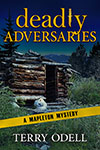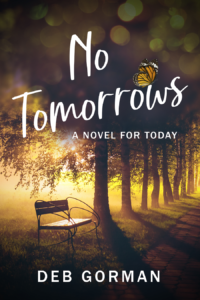Have you ever been involved in some intense situation and your account doesn’t match up with others who were there and involved?
The human mind and memory is a curious thing. When I’m with the family members I grew up with, it’s always fascinating to hear their stories about growing up, but each of us remembers the anecdotes differently. They spin these tales, I watch their lips move, and wonder what the hell they’re talking about.
Case in point. Let’s talk about eye witnesses, but not from a legal standpoint. Let’s simply discuss what we see, and why it’s different, likely resulting from different backgrounds and worldly experiences.
John Gilstrap and I were in Indianapolis a few years ago, along with our wives, attending Magna Cum Murder, a small writing conference full of heart and camaraderie. On that October day in question, the four of us were having drinks outside a grand old club on Monument Circle, enjoying the company and cool weather.
John made dinner reservations at a steakhouse within walking distance, but we’d been out there for a couple of hours and it was necessary to visit the hotel’s facilities first. I’m not sure why we both decided to go at the same time, and I really don’t want to discuss that here, but….
…his wife, Joy, and my bride, Shana, continued their conversation as we left. The current Columbia Club was built in 1925, and the restroom at the far end of the grand lobby of marble and tile was some distance from the front entrance, monitored by traditionally well-dressed doormen.
I reached out to Gilstrap, who two-fingered his version of that clear Indianapolis day and sent it over. I promise, the skies were bright and blue, we all agree on that.
*
Murder At The War Memorial
The lobby of Columbia Club in Indianapolis reeks of Old Money, from its elegant carved wood moldings and soaring ceiling to the dark wood bar to the massive walk-in fireplace. That golden eagle in the corner once stood guard over Abraham Lincoln’s funeral bier. It is the perfect location for a mystery writers’ conference, and so it served for one of my annual favorites, Magna Cum Murder. The conference started on Friday, so Thursday was all about arrival, checking in and meeting up with new friends. My wife, Joy, doesn’t always go to these things with me, but a few years ago, she came along because my buddy Reavis’s wife, Shana, was accompanying him. You haven’t seen trouble until Joy and Shana knock around together.
Somehow, Rev and I found the bar before the ladies did–by the span of a couple of drinks and a dozen war stories–and because it was such a nice early autumn day, we partook of our libations on the patio in the front of the hotel, across the street from the towering War Memorial obelisk. From this vantage point, we could watch the valet parking team do its work and wave hello to writers and readers we’ve seen year after year at Magna.
Finally, the ladies joined us, and after a little while, those early libations caught up with Rev and me and certain biological realities kicked in. I’m not sure which one of us excused ourselves first, but the trip to the men’s room became a dual effort.
We left our wives at the table to catch up with each other.
The restrooms at the Columbia Club are not conveniently located. It’s a bit of a hike to get to them. So, having left the ladies alone for five, maybe seven minutes, as Rev and I are heading back to the front doors, I notice a lady and a little boy on my left, pressing themselves into a corner by the luggage closet, and the valets are in the opposite corner. How odd. Then, when we stepped out into the sunshine, I glanced at the table where we’d left our wives, saw that their chairs were empty, and then, from across the street, at the base of the obelisk, I saw two men running, one behind the other. The one in the rear was a cop. The cop yelled, “Police! Don’t move!” Then took a shooter’s stance, fired, and the runner face planted onto the concrete. In that instant, I thought he’d shot with a pistol, but it turned out to be a Taser. That explained the quietness of the report.
Like most violence, the whole scene transpired over maybe ten seconds. I said to Rev, “The ladies missed the whole show.”
He replied, “No, they didn’t. They’re in the middle of it.” He pointed to a scrum of activity centered around a screaming lady, and sure enough, there they were.
*
His recollection ends here for the purposes of this discussion, but different viewpoints and proximity, as well as several minutes of extra knowledge, can sharpen the event.
“Eyewitnesses can provide very compelling legal testimony, but rather than recording experiences flawlessly, their memories are susceptible to a variety of errors and biases. They (and that’s all of us) can make errors in remembering specific details and can even recall whole events that did not actually happen.” Cara Laney and Elizabeth F. Loftus, Reed College, University of California, Irvine.
*
John’s view ends his story at the perfect place. Now my Bride picks up the narrative.
She is a former degreed journalist and as an old-school newspaper reporter, deals in facts, less emotion.
(She quickly came over from the dark side and moved into public education where we met.)
If she hears a story, or half of one, she’ll ruthlessly drill down until she discovers the truth. Both daughters can vouch for that from teenage experience. The truth is, I’d prefer to spin my stories when she isn’t present, if you know what I mean…
*
“Well, since the girls were there the whole time, we saw and heard much more.
“The screaming and yelling moved us toward the melee to see if we could help. The man, who was not wearing dark clothing, was hitting a woman who was crumpled on the ground next to a raised wall. I believe he was wearing a t-shirt. I guess his pants were dark. He then ran across the monument area looking for another victim. As we moved toward where he was going, we saw a man with a white dress shirt with blood on it standing near a man who was hurt and laying on steps. He was obviously trying to make sure the assailant did not return and cause more harm to the man on the ground that he had apparently targeted earlier.
“We later learned the blood on his shirt was that of the victim – he was a doctor trying to render aid. Later that night we were told that the victim sadly did not survive. Also near the area was a group of people who had come down to bring food to the homeless. All were prepared to intervene in some way, but the police arrived quickly and confronted the assailant. He did not heed their warnings and kept moving. They tazed him as he moved away from them, but the direction was not toward where we were standing with the guys at this point. If we were facing north, he was running east.
“It was all very unsettling. Joy later mentioned that she would not have felt as confident in our moving in closer to the tragic events unfolding if she had known I was not carrying protection. I normally do, but since we were with the guys, I was not. Lesson learned.”
*
We’re all susceptible to erroneous accounts for a variety of reasons. I think mine differs because like John, I’m a storyteller and have related this event over and over, likely embellishing it because of audience reaction whenever I give a talk. Or maybe because I simply like my version better.
*
The girls were settled on an outside settee as two fairly well-known authors headed for the necessary room. After the hike back, strange activities at the front doors caught our attention. I woman huddle with her little one (age between four and eight) to our left, burrowing into the luggage coat section. The woman gave us a fearful look, and ducked back down as if an artillery barrage was about to ensue.
Exchanging puzzled looks, we pushed past a tense-faced doorman and into the covered entrance where I heard shouting.
Orders came fierce and strong. “Stop!”
“Get on the ground!”
Men and women screamed.
A huddle to the right across the street caught my attention and action to our left moved fast. A man raced in our direction, in my memory wearing dark running clothes, and one of two pursuing officers shouted again.
“Stop!”
The brain slows. Too much information. Something bad.
I looked past the assailant and down the barrel of what I thought was a handgun as the closest officer took a stance and fired. Instead of the report of a firearm, the fleeing suspect stiffened and fell hard on his face. Tazed.
Blinking, I looked to the left to see another man down, surrounded by good Samaritans who’d gathered to render air. That’s when time kicked back and concern swept over me.
John frowned. The ladies missed the whole show.
*
As they said, they didn’t. The instinct to protect others kicked in and both our wives rushed in to help defend others against a demented criminal who’d just been released from jail that morning.
Misinformation can corrupt memory in the aftermath of an event. When more than one person witnesses a crime and discusses it with others before officials arrive, they are likely to have noticed different things because witnesses have different personalities and that individuality shows up in recollections. Together they reinforce those shared memories and contaminate them with information from others.
The differences here are subtle, but collecting the three accounts…(and forgive me, because due to time limitations writing this at the last minute, I didn’t get Joy’s take, which had a little twist that made her participation even more interesting)…shows the reader that eyewitness testimony will never be exact.
The Old Man told me growing up not to believe most of what I hear, and only half of what I see. The older I get, the more I realize how smart he was.









 Significant events can be individual, familial, national, or international.
Significant events can be individual, familial, national, or international.
 There are other major historic milestones. Another for me was the assassination of JFK. I was in high school history class, which was being taught by a ‘student teacher.’ I don’t know what they’re called in other regions, but this was part of the required curriculum for anyone wanting a teaching certificate in Los Angeles, and it was late enough in the semester that the teacher himself felt he could leave the room and leave her in charge. I don’t remember their names, but I remember he came into the room and interrupted the lesson and announced the assassination. Everyone’s first reaction was that he was playing up the curse that presidents elected in years with zeroes would come to a bad end. Then we noticed he was crying, and the shock hit us. School was dismissed for the day.
There are other major historic milestones. Another for me was the assassination of JFK. I was in high school history class, which was being taught by a ‘student teacher.’ I don’t know what they’re called in other regions, but this was part of the required curriculum for anyone wanting a teaching certificate in Los Angeles, and it was late enough in the semester that the teacher himself felt he could leave the room and leave her in charge. I don’t remember their names, but I remember he came into the room and interrupted the lesson and announced the assassination. Everyone’s first reaction was that he was playing up the curse that presidents elected in years with zeroes would come to a bad end. Then we noticed he was crying, and the shock hit us. School was dismissed for the day.

 Like bang for your buck? I have a
Like bang for your buck? I have a 



 Private pilot Cassie Deakin declares her distrust of handsome men in the first paragraph of Lacey’s Star. That statement foreshadows her flawed decisions on trust throughout the book and almost gets her killed.
Private pilot Cassie Deakin declares her distrust of handsome men in the first paragraph of Lacey’s Star. That statement foreshadows her flawed decisions on trust throughout the book and almost gets her killed. “I’m completely library educated. I’ve never been to college. I went down to the library when I was in grade school in Waukegan, and in high school in Los Angeles, and spent long days every summer in the library… I discovered me in the library. I went to find me in the library. Before I fell in love with libraries, I was just a six-year-old boy. The library fueled all of my curiosities, from dinosaurs to ancient Egypt.” — Ray Bradbury
“I’m completely library educated. I’ve never been to college. I went down to the library when I was in grade school in Waukegan, and in high school in Los Angeles, and spent long days every summer in the library… I discovered me in the library. I went to find me in the library. Before I fell in love with libraries, I was just a six-year-old boy. The library fueled all of my curiosities, from dinosaurs to ancient Egypt.” — Ray Bradbury


